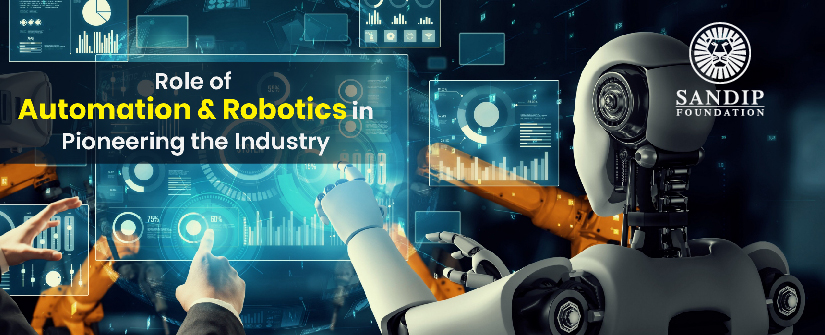In the relentless pursuit of efficiency, innovation, and progress, industries worldwide are embracing the transformative power of automation and robotics. From manufacturing to healthcare, agriculture to logistics, these cutting-edge technologies are revolutionising the way we work, produce, and interact with the world around us. Many top computer engineering colleges in Maharashtra offer undergraduate and postgraduate programs in automation and robotics that can help revolutionise the future of the industry.
In this blog, we delve into the myriad ways automation and robotics are shaping the future of industry, driving productivity, enhancing safety, and unlocking new realms of possibility.
The Rise of Automation
Automation, the use of technology to perform tasks with minimal human intervention, has been a cornerstone of industrial advancement for decades. However, recent advancements in artificial intelligence (AI), machine learning (ML), and robotics have propelled automation to unprecedented levels of sophistication and ubiquity.
Enhanced Efficiency
One of the most significant benefits of automation is its ability to streamline processes and boost efficiency. Automated systems can perform repetitive tasks with unparalleled precision and speed, reducing production times and minimising errors. This increased efficiency translates into cost savings, improved quality control, and enhanced competitiveness for businesses across sectors.
Safety and Risk Mitigation
Automation also plays a crucial role in enhancing workplace safety by automating hazardous or physically demanding tasks. By delegating these tasks to robots or automated systems, companies can minimise the risk of accidents and injuries, creating safer working environments for employees.
Scalability and Flexibility
Moreover, automated systems offer scalability and flexibility, allowing businesses to adapt quickly to changing market demands and fluctuations in production volumes. Whether ramping up output during peak periods or adjusting to unforeseen disruptions, automation provides the agility needed to stay responsive and resilient in today’s dynamic business landscape.
Robotics: Shaping the Future of Industry
While automation encompasses a broad spectrum of technologies, robotics stands out as a transformative force driving innovation across industries. From industrial robots working alongside human operators on factory floors to autonomous drones revolutionising supply chain logistics, the potential applications of robotics are vast and diverse.
Collaborative Robotics
One of the most exciting developments in robotics is the emergence of collaborative robots, or “cobots.” Unlike traditional industrial robots confined to cages or dedicated workspaces, cobots are designed to securely collaborate with human operators to complement their skills and boost output overall. This collaborative approach combines the strengths of human intuition and creativity with the precision and repeatability of robotic automation, unlocking new levels of efficiency and adaptability.
Autonomous Vehicles and Drones
In addition to the manufacturing sector, robotics is reshaping industries such as transportation and logistics through the development of autonomous vehicles and drones. Self-driving cars and trucks promise to revolutionise the way goods are transported, offering unparalleled efficiency and safety on roadways. Meanwhile, drones are revolutionising last-mile delivery, aerial surveillance, and infrastructure inspection, offering fast, cost-effective solutions for a variety of applications.
Healthcare and Beyond
Beyond traditional industrial settings, robotics is also making significant inroads in healthcare, agriculture, and service industries. Surgical robots are enabling minimally invasive procedures with greater precision and control, while agricultural robots are revolutionising crop management and harvesting techniques. Service robots are also becoming increasingly common in settings such as hospitality, retail, and elder care, augmenting human capabilities and enhancing customer experiences.
Embracing the Future
As automation and robotics continue to evolve, it is essential for businesses to embrace these technologies and harness their transformative potential. By investing in automation solutions, companies can drive innovation, improve productivity, and gain a competitive edge in today’s rapidly changing marketplace. However, successful implementation requires careful planning, investment in workforce training, and a strategic approach to technology adoption.
Moreover, it is crucial to address potential challenges such as job displacement and ethical considerations surrounding the use of AI and robotics. While automation has the potential to create new opportunities and jobs in emerging fields, it is essential to ensure a smooth transition for workers affected by technological change and to prioritise ethical considerations such as data privacy, algorithmic bias, and the impact on society as a whole.
Automation and robotics have been revolutionising various industries, creating a plethora of new career opportunities. Here are some career paths that individuals can explore in this field:
Robotics Engineering: This involves designing, building, and testing robots for various applications, such as manufacturing, healthcare, agriculture, and space exploration.
Automation Engineering: Automation engineers develop and implement automated systems and processes to streamline operations in industries like manufacturing, energy, and transportation.
AI & ML specialists: Professionals in this field develop algorithms and models that enable robots and automated systems to learn and make decisions based on data.
Robot software developer: This involves coding software for robots to control their movements, perception, and decision-making capabilities.
RPA specialists: RPA specialists develop software robots that automate repetitive tasks in business processes, such as data entry, customer service, and financial transactions.
Human-Robot interaction specialists: HRI specialists focus on designing intuitive interfaces and interactions between humans and robots to enhance collaboration and safety in various settings.
Robot Ethicists & Policy Analyst: As robotics technology becomes more pervasive, there is a growing need for experts who can address ethical considerations and develop policies to govern the use of robots in society.
Conclusion
Automation and robotics represent the future of industry, offering unparalleled opportunities for innovation, efficiency, and growth. By embracing these technologies and leveraging their transformative power, businesses can unlock new realms of possibility and shape a more prosperous and sustainable future for generations to come.

